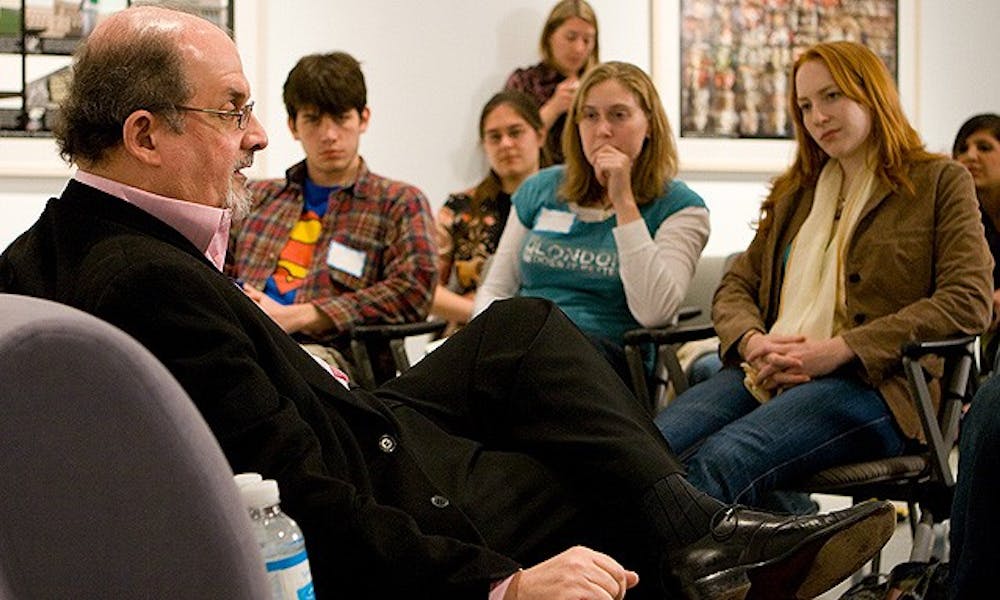Acclaimed author Salman Rushdie spoke about the power of literature to address human freedoms and conflict in the contemporary world, where public events increasingly impact private lives.
Rushdie, author of 10 novels including “Midnight’s Children” and “The Satanic Verses,” spoke Tuesday before a sold-out audience in Page Auditorium about instances when literature helped to bring down brutal regimes. In situations where the truth is obscured, Rushdie feels novels can shed light on true stories outside government reports and prejudiced information.
“Prose, the literary novel of the poet, has been historically and still is at the forefront of opposition of tyranny,” Rushdie said. “No one owns the novelist’s vision except for the novelist... he has the power to make and remake reality and explore it in a manner and on the terms he chooses that are not dictated to him by anyone else.”
Rushdie’s speech, “Public Events, Private Lives: Literature and Politics in the Modern World,” marked the eighth annual John Hope Franklin Humanities Institute’s Distinguished Lecture. He was introduced by FHI Director Ian Baucom and Srinivas Aravamudan, dean of humanities and an English professor.
“For over a 30-year writing period [Rushdie has] transformed the history of the novel, altered and enriched the aesthetic possibility of the English language,” Baucom said. “[He] promises to continue and build on that rich tradition of challenging and opening common addresses, which our previous [FHI] guests have established.”
In the past, novelists served as news gatherers for society in bringing national issues to public attention, said Rushdie, pointing to authors like Charles Dickens and Harriet Beecher Stowe who used their works to expose the evils of slavery. In the modern world, Rushdie said novels can continue to serve an integral role in telling meaningful stories and uncovering cultural conflicts—as opposed to some contemporary news sources, which he said have ulterior motives that affect their ability to remain objective.
“We have a situation where opinion polls tell us the most trusted news network in this country is Fox News. This makes one feel worried about the American people... if they actually want the news or prefer the precarious fiction that appears on the Fox News program,” Rushdie said. “Literature is the place where you find truth.... It’s a level of news which is much more profound than what’s being offered in the so-called news media.”
Rushdie also addressed literature’s power to showcase individuality, as it imbues characters with unique—and sometimes inconsistent—qualities to reflect human nature. In an era where some influential figures promote conformity, Rushdie said the novel can act as a vehicle for both personal development and the establishment of common ground with others.
“The novel understands that the human self is plural, contradictory, fragmented, awkward and sometimes irreconcilable with itself and is changeable and mutable,” he said. “Yet we live in an age where the growing power of identity politics tries to urge us into... much more narrow, fixed, solid and unitary ideas of the self.”
Rushdie closed his speech by urging students to “push out boundaries” and become active in movements for change. He connected this to his own literary struggles when Iranian religious leader and politician Ayatollah Ruhollah Khomeini issued a fatwa—or call for murder—against Rushdie for “The Satanic Verses.” Amid this threat to his life, Rushdie never faltered in his original intent to speak about hardship associated with Islamic identity and religion.
“The problem with the world we live in is that there are those who don’t want the universe opened a little more,” Rushdie said. “The counter force can be very powerful and very hard to resist and sometimes the consequences for the writer can be very serious... all of us do this kind of work knowing the risks, would still say it has to be done because that’s the job.”
After his speech, Rushdie responded to questions from the audience. When asked about his thoughts on multiculturalism, Rushdie said he fears that the mixing of cultures is becoming confused with cultural relativism—the ability of individuals to claim preferential treatment based on their different values.
“When you go down that road you’ve created not just a morally indisputable situation but [also] a divisive one,” he said. “In any open country, it must be possible to argue about value and practices, not to ring a fence around communities by virtue of their culture.”
Senior Karan Chhabra, co-president of Diya, said he felt the author provided valuable insights and connected well with the audience.
“I was very pleased with how well he able to bridge the intellectual and the personal,” Chhabra said. “He managed to comment critically on work, politics and society, but was also [able] to engage the audience in a very human way and connect with students who have never heard of him as well as scholars who have studied him for years.”
The event was sponsored by the FHI, Diya, Office of the President; Office of the Provost; Office of the Vice Provost for the Arts; Office of the Dean and Vice Provost of Undergraduate Education; Center for Philosophy, Arts and Literature; Duke Islamic Studies Center; North Carolina Consortium for South Asian Studies; and the John Spencer Bassett Memorial Fund.
Get The Chronicle straight to your inbox
Sign up for our weekly newsletter. Cancel at any time.

